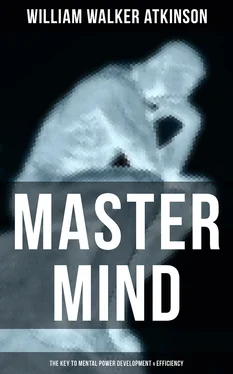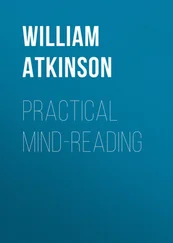William Walker Atkinson
Master Mind
(The Key to Mental Power Development & Efficiency)
The Principles of Psychology: Secrets of the Mind Discipline
Published by

Books
- Advanced Digital Solutions & High-Quality eBook Formatting -
musaicumbooks@okpublishing.info
2017 OK Publishing
ISBN 978-80-7583-933-6
Chapter 1 The Master Mind Chapter 1 The Master Mind Table of Content In this book there will be nothing said concerning metaphysical theories or philosophical hypotheses; instead, there will be a very strict adherence to the principles of psychology. There will be nothing said of ''spirit'' or "soul''; but very much said of "mind." There will be no speculation concerning the question of "what is the soul," or concerning "what becomes of the soul after the death of the body." These subjects, while highly important and interesting, belong to a different class of investigation, and are outside of the limits of the present inquiry. We shall not even enter into a discussion of the subject of "what is the mind"; instead, we shall confine our thought to the subject of "how does the mind work." For the purposes of the present consideration of the subject before us, we shall rest content with the fundamental postulate that "Every man or woman has a mind," and the corollary that when an intelligent man or woman speaks of "myself," he or she is conscious that his or her "mind" has a more intimate relation to that "self" than has his or her "body.'' The ''body" is usually recognized as "belonging to" the "self," while the "mind" is usually so closely identified with the "self" that it is difficult to distinguish them in thought or expression. Many philosophers and metaphysicians have sought to tell us "just what" the mind is; but they usually leave us as much in doubt as before the so-called explanation. As the old Persian poet has said, we usually "come out the door in which we went," in all such discussions and speculations concerning the nature of mind, or "just what mind really is." We can, and do, know much about how the mind works, but we know little or nothing about what the mind really is. But, for that matter, so far as practical purposes are concerned, it makes very little difference to us just what the mind is, providing we know just how it works, and how it may be controlled and managed.
Chapter 2 The Mind Master
Chapter 3 The Slave Will and The Master Will
Chapter 4 Positive and Negative Mentality
Chapter 5 The Senses and Sensations
Chapter 6 Perception
Chapter 7 Attention
Chapter 8 The Mastery of Perception
Chapter 9 Exercises in Perception
Chapter 10 The Mastery of Emotion
Chapter 11 The Categories of Feeling
Chapter 12 The Mastery of Desire
Chapter 13 The Mastery of Thought
Chapter 14 Mastery of Reasoning
Chapter 15 Subconscious Mentality
Chapter 16 The Mastery of Will
Ideals for Will Culture
Chapter 1
The Master Mind
Table of Content
In this book there will be nothing said concerning metaphysical theories or philosophical hypotheses; instead, there will be a very strict adherence to the principles of psychology. There will be nothing said of ''spirit'' or "soul''; but very much said of "mind." There will be no speculation concerning the question of "what is the soul," or concerning "what becomes of the soul after the death of the body." These subjects, while highly important and interesting, belong to a different class of investigation, and are outside of the limits of the present inquiry. We shall not even enter into a discussion of the subject of "what is the mind"; instead, we shall confine our thought to the subject of "how does the mind work."
For the purposes of the present consideration of the subject before us, we shall rest content with the fundamental postulate that "Every man or woman has a mind," and the corollary that when an intelligent man or woman speaks of "myself," he or she is conscious that his or her "mind" has a more intimate relation to that "self" than has his or her "body.'' The ''body" is usually recognized as "belonging to" the "self," while the "mind" is usually so closely identified with the "self" that it is difficult to distinguish them in thought or expression.
Many philosophers and metaphysicians have sought to tell us "just what" the mind is; but they usually leave us as much in doubt as before the so-called explanation. As the old Persian poet has said, we usually "come out the door in which we went," in all such discussions and speculations concerning the nature of mind, or "just what mind really is." We can, and do, know much about how the mind works, but we know little or nothing about what the mind really is. But, for that matter, so far as practical purposes are concerned, it makes very little difference to us just what the mind is, providing we know just how it works, and how it may be controlled and managed.
A well-known psychologist has well said: "It used to be the fashion to begin psychologies with a discussion concerning the material or immaterial nature of the mind. It has been well said that psychology is no more bound to begin by telling what the mind is, than physics is obliged to start by settling the vexed question as to what matter is. Psychology studies the phenomena of mind, just as physics investigates those of matter.
Fortunately, phenomena do not change with our varying views as to what things really are. The phenomena of electricity remain the same whether we consider it a fluid, a repulsion of molecules, or vibrations of the ether. If a man hold the strange theory that electricity was a flock of invisible molecular goats that pranced along a wire with inconceivable rapidity, he would still have to insulate the wires in the same way, generate the current in the same way. A strong discharge would kill him as quickly as if he held a different theory. In short, his views of the ultimate substance of electricity would in nowise change its phenomena.
If any materialist should hold that the mind was nothing but the brain, and that the brain was a vast aggregation of molecular sheep herding together in various ways, his hypothesis would not change the fact that sensation must precede perception, memory, and thought; nor would the laws of association of ideas be changed, nor would the fact that interest and repetition aid memory cease to hold good. The man who thought his mind was a collection of little cells would dream, imagine, think, and will; so also would he who believed his mind to be immaterial. It is very fortunate that the same mental phenomena occur, no matter what theory is adopted. Those who like to study the puzzles as to what mind and matter really are, must go to metaphysics. Should we ever find that salt, arsenic, and many things else, are the same substances with a different molecular arrangement, we should still not use them interchangeably.
Another well-known psychologist, speaking upon the same subject, calls our attention to the custom of a celebrated teacher of psychology who usually began his first lecture by bidding his pupils to "think about something, your desk, for example"; he who would then add: "Now think of that which thinks about the desk"; and then, after a few moments concluding the remark with the statement: "This thing which thinks about the desk, and about which you are now thinking, is the subject matter of our study of psychology."
The psychologist above mentioned has said further on this subject: "The mind must either be that which thinks, feels, and wills, or it must be the thoughts, feelings, and acts of will of which we are conscious— mental facts, in one word.
Читать дальше













